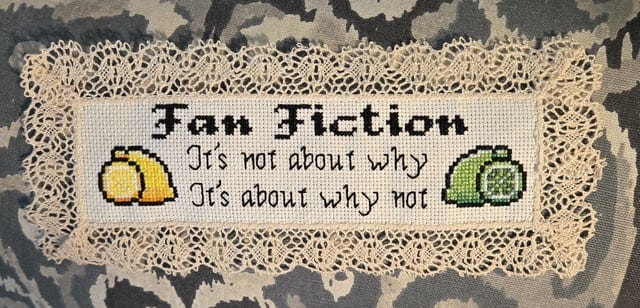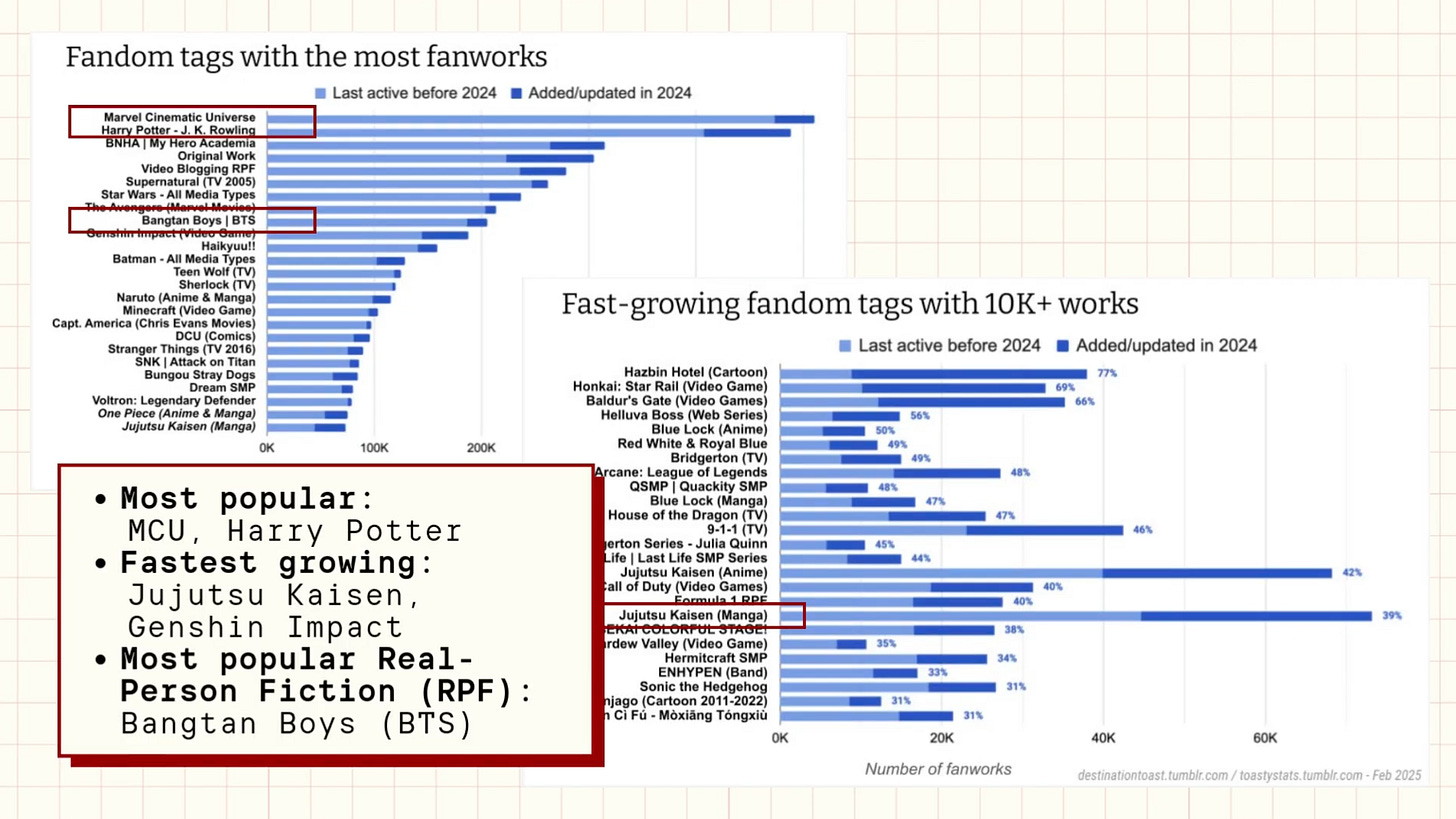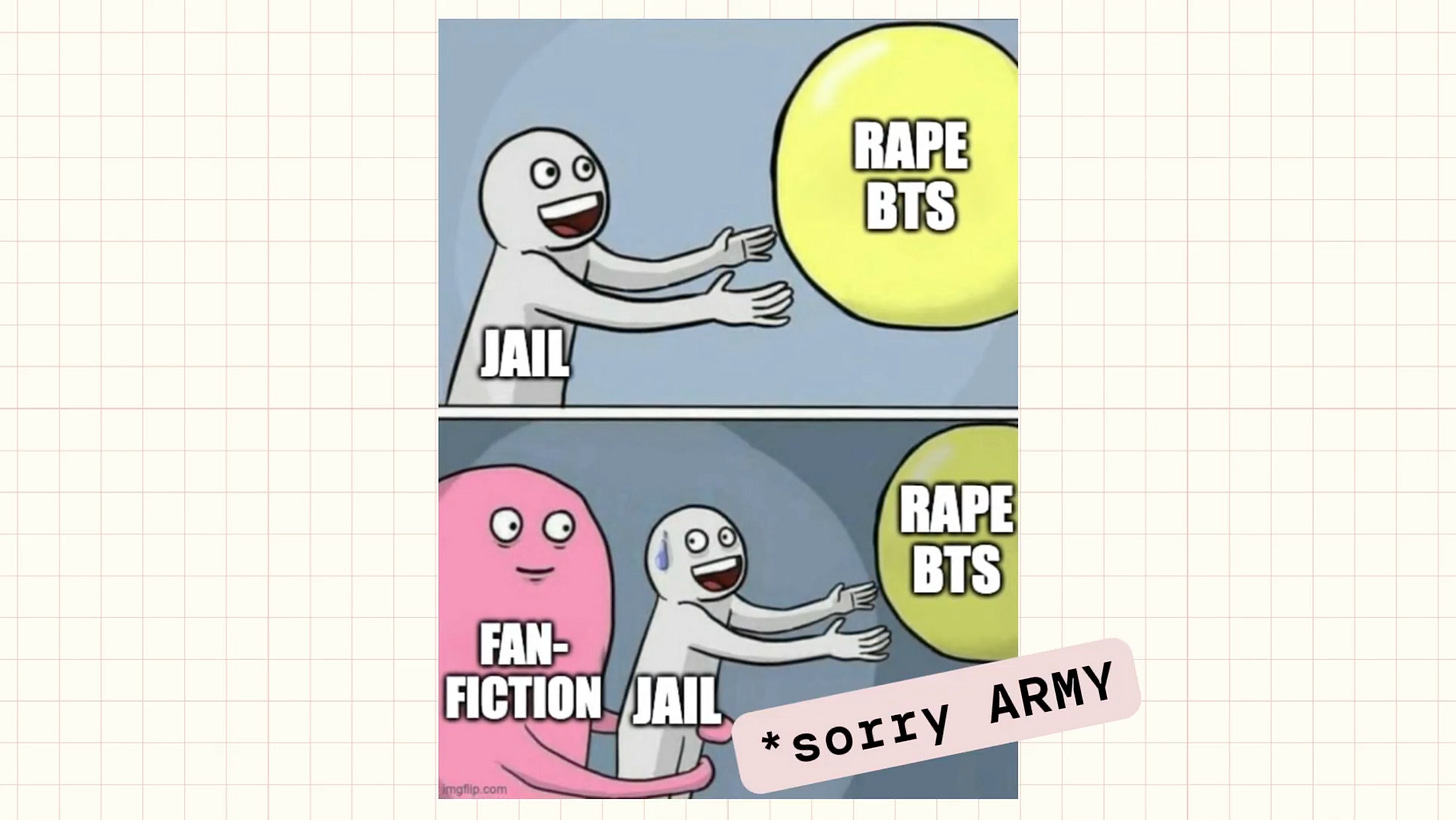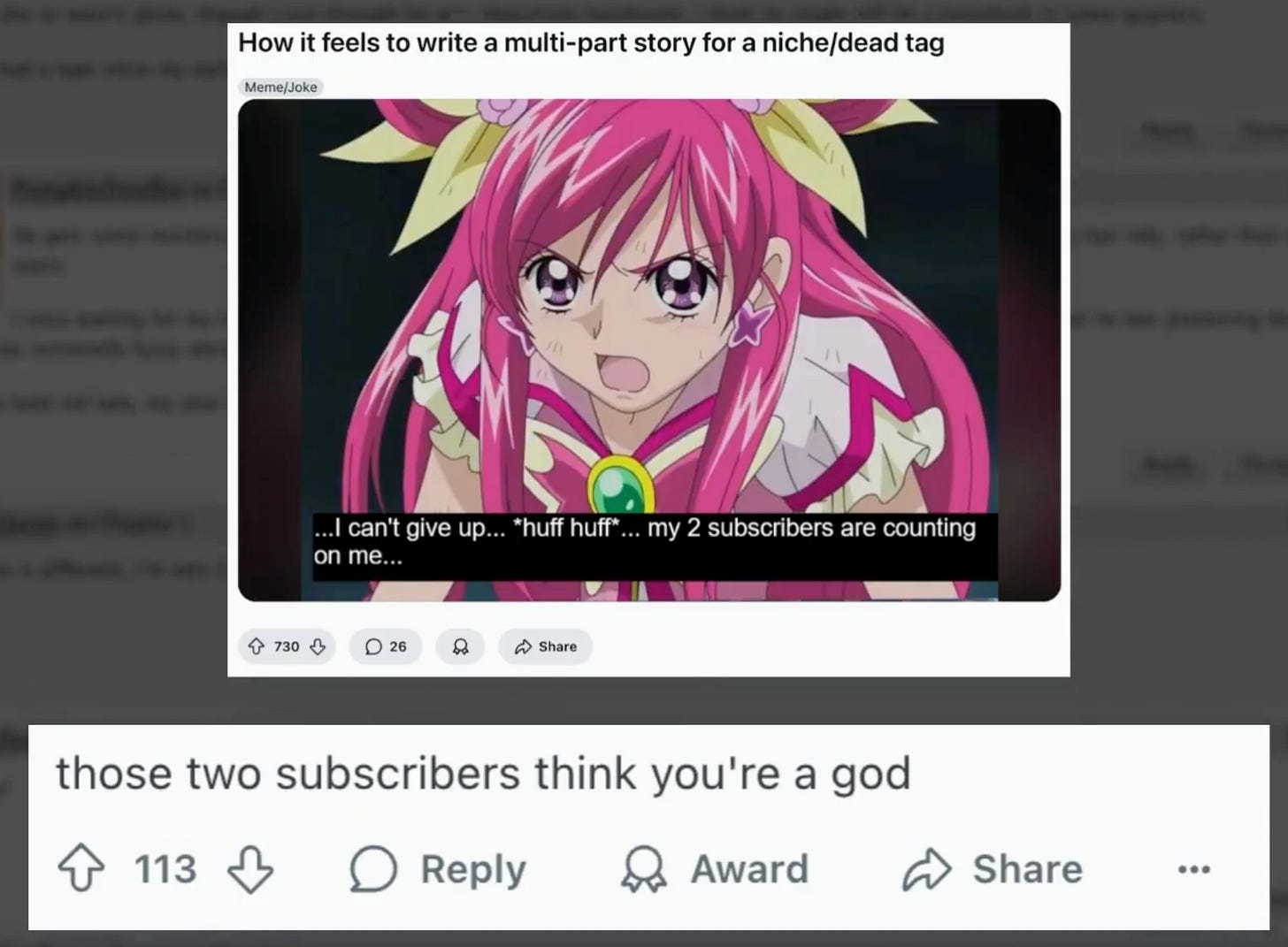Exploring the "Self" on AO3
What is it like to be a writer on the world’s largest fanfiction site?
*Forewords
This is my Cyber-Ethnography Project for my class Digital Anthropology. As an avid fan of Archive of Our Own (AO3), I am fascinated by many aspects of the community it has brought me: the thrill of reading a fanfic, the pride when my fic gets kudoed, and the joy when commenting with other writers and readers. I could not incorporate all my findings into this video, but all the nights spent reading comments gave me a lot of inspiration and encouragement.
There are many ways you can enjoy this video:
Watch the video below
Watch on Youtube: https://youtu.be/8ci07MbQHGM
Read the script as if reading a 1800-word post =))
Enjoy!
Introduction & Arguments
What is it like to be a writer on the world’s largest fanfiction site?
Welcome to Archive Of Our Own, or AO3, “a fan-created, fan-run, nonprofit, noncommercial archive for transformative fanworks, like fanfiction, fanart, fan videos, and podfic.”
Here’s a shorter definition: AO3 is a website where you can browse or post your own fanworks, mostly fanfiction. Since its establishment in 2009, as of May 2025, AO3 has reached more than 8M registered users with 14M works across over 70,000 fandoms, making it one of the world’s largest fanwork sites.
To be an AO3 writer, you only need to sign up for a free account, write your fic and click Post. But it also isn’t that simple. I find myself contemplating what to write, how to tag it, and how people receive it. Posting fanfiction on AO3 means being in a broader community of writers, readers, of fans and even non-fans.
In this video, I examine the act of writing and posting fanfiction on AO3, particularly:
How does the website mediate writing and posting?
How do these activities contribute to the writer’s sense of self?
How the AO3 user community influences this perception.
My argument is: AO3 offers fanfiction writers a constraint-free space to express and cultivate a “self” that might be difficult to achieve in real life. This “self” is reinforced and enhanced by interactions within the AO3 user community.
Literature Review
While conducting a literature review, I found out that AO3 is part of the Organization for Transformative Works (OTW), an initiative promoting fan culture, so I examined several publications from OTW’s peer-reviewed academic journal on fanworks and practices.
In their article, Gosh and Aragon discuss how community support and platform affordances of online fanfiction communities motivate the creation of fanfiction. The availability of fanfiction, discussions about writing skills, and emotional support from fellow writers and readers incentivize passive readers to take on the role of writers. These are useful to look at when I examine AO3 writers’ motivations.
In the editorial “Fandom and/as Labor,” Stanfill and Condis conceptualize fanfiction writing and fan activities in general as “pleasurable labor.” This concept distinguishes from Marx’s theory of labor, in that “pleasurable labor” doesn’t involve commodification or the subsequent alienation of labor’s product. This offers me an insight about a non-commercial platform like AO3: fanfiction writers own both the process and product of labor, thus having a deep attachment to their writing.
Returning to my questions, I will use
Nardi’s concept of “affordances”: the intended or unintended capabilities of technology that can mediate users’ activities. AO3’s affordances decide what writers can and cannot do on the website, thus shaping their experiences and behaviors during and after posting works.
I will also use Charles Taylor’s concept of “expressive self” in online spaces, a “modern notion of expression as an articulation which both manifests and defines, closely tied to the idea of a self, a subject.” This concept helps me explain the significance of posting fanfiction as reflecting personal interests and also self-cultivation.
My last concept is Bargh and McKenna’s “virtual group membership.” As members of online communities, people can obtain insights, encouragement, and a sense of belonging that might not be available in the offline world. This helps explore the dynamics that writers experience in the online community developed from AO3.
Methods
My methods involve the AO3 website, where I explored the posting interface and also carefully read the Terms of Service to understand regulations for posting fanfiction. I also browsed several fanfictions in popular fandoms and looked at the comments to see how writers and readers interact.
I noticed that, other than these comments, AO3 doesn’t accommodate further discussions like social media platforms. Therefore, I expanded my research onto subreddit r/AO3, where posts and replies gave me insights about the characteristics, behaviors, and perceptions of writers regarding my research questions.
A constraint-free space to express and cultivate “self”
My first argument is: AO3 offers fanfiction writers a constraint-free space to express and cultivate a “self” that might be difficult to achieve in real life.
So, why AO3 out of all fanfiction sites?
Let’s look at the top 3 popular, AO3, Wattpad and Fanfiction.net. Wattpad makes money out of many fanfictions as well as pop-up ads. Fanfiction.net escapes capitalism, yet it is frustrating to navigate through your favorite fandoms since the tags just don’t work well. Meanwhile, AO3 is commerce-free while also employing an effective filtering system.
First, regarding its non-commercial nature, AO3 is a response to mass commercialization of major fanfiction sites, turning writing fanfiction into a burden instead of a hobby. AO3 strictly prohibits any form of commerce, which means that instead of worrying about what plots can make money, writers can just focus on writing and sharing whatever they want.
Another remarkable affordance of AO3 is the tagging system. Besides required tags on general information (ratings, content warnings, and fandom), there are also user-curated tags. Writers can create their own tags to clarify the content of their works in great detail, for example, an alternative universe in which Harry Potter is a vampire with PTSD. Or, they can use tags to communicate their feelings and writing process, like lack of sleep or confusion with the tagging system itself.
These tags not only mark the fic’s uniqueness but also the writer’s uniqueness. By creating personalized tags, writers portray themselves as fanfiction writers with particular interests, styles, or even behaviors. Applying Taylor’s concept of “expressive self,” this “self” emerging from fanfiction tags is not only a demonstration of what the writer is like but also a creation of aspects of themselves unexplored in real life.
What do I mean by “unexplored?”
If you notice, some tags are “problematic” in real life. For instance, in BTS fandom, there are more than 10,000 fics on rape/non-consensual, or underage sex. It might feel quite uncomfortable to depict real-life people being raped, but this is exactly another affordance of AO3: very few content restrictions.
AO3 is based in and complies to U.S. laws, which means it is legal to create and share fictional content about crimes, including child sexual abuse, rape, incest, or bestiality. This corresponds to AO3’s mission: “to host transformative fanworks without making judgments based on morality or personal preferences.”
While you can be jailed for raping BTS in real life, you won’t be judged for raping them in an AO3 fic, because it is fictional.
Fanfiction draws an impenetrable line between imagination and real-life limitations, between public expressions of personal desires and social regulations. According to Taylor, technology enables this creative imagination, and gives us power to gain new understanding our ourselves, to manifest for self-completion.
AO3 offers a safe space for the wildest fantasies that one can have for their beloved figures, allowing them to delve into their innermost desires.
For some people, writing fanfiction is even a way to cope with psychological traumas or to challenge stereotypes, such as the idea that “straight people can’t write gay relationships.” Pushing beyond limitations of their bodies, mentalities, and backgrounds, writers explore possibilities and re-create themselves via fanfiction.
Community interactions: Re-enforcement and enhancement
So writing fanfiction helps self-exploration, but why bother posting?
When writers post their work on AO3, it is no longer an individual self-expression, but an active sought for like-minded people.
This is my second argument: The “self” expressed and cultivated via posting fanfiction is reinforced and enhanced by interactions within the AO3 user community.
Considering readers, AO3 provides various forms of reader metrics. Qualitative comments are considered huge emotional boost for writers. This is what Bargh and McKenna call “virtual group membership.” By writing fanfiction and sharing personal interests, people gain emotional support, form close relationships, which eventually become a motivation to write and engage more with the community.
There are also quantitative statistics such as “hits,” “kudos,” and user subscriptions. One interesting insight is that achievement is not always about big numbers. For example, a writer shares their motivation to write for a niche tag: “I can’t give up. My 2 subscribers are counting on me.” To be replied with “those two subscribers think you’re a god.”
This reply is interesting because it praises the writer’s dedication and also the writer themself, comparing them to “a god” for their kindness and significance to the 2 readers who crave the unpopular tag. Any recognition for writing is a recognition for the writer’s capabilities as a human being.
AO3 membership can become crucial to one’s self-concept, because fanfiction fosters a community whose members not only celebrate shared passions but also individual endeavor and identity:
Being an AO3 writer also means engaging with other writers. People often exchange opinions on writing techniques and conventions; emotional support such as pride for accomplishments, encouragement when receiving hate comments; and most importantly, what writing fanfiction means.
Although readership is invaluable, writers emphasize that:
AO3 writers assure each other that writing fanfiction as a form of self-expression should be free from the stresses of writing itself. If their writing is kudoed or commented, that’s worthy of celebration. If their writing is not, that’s also worthy of celebration. Fanfiction isn’t about creating the best story, but creating your story.
The community’s peer support affirms that all personal stories are valuable regardless of writing skills, experiences, or backgrounds. When a writer learns better ways of writing, they also learn better ways to express themselves. When they appreciate their writing’s uniqueness, they also appreciate their uniqueness.
Final thoughts
As an AO3 writer, writing fanfiction improves my life in many ways. AO3 accommodates diversity and individuality, asserting that every fanfiction and every writer is valued. Free from commercial, legal, or ethical constraints, it creates an online community where I can receive recognition and advice to explore my writing and myself.
AO3 is vast: lots of fandoms, couple-shipping, languages, and preferences. But at its core, the archive is powered by individuals who take a step out, write fanfictions that are meaningful for the fandom and for themselves.
So, if you have a story or a person that you love, try writing a fanfiction, because why not?





















pov: you just spent 8 hours vibing on AO3 with your ships and now find yourself reading a legit academic paper about AO3 on Substack lmao =)))))))))) btw your fully dedicated research is seriously awesome, such a solid proof that people should use AO3 more for academic purposes….